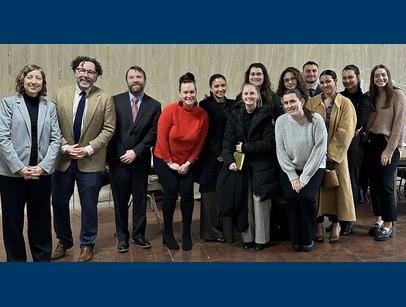First-Year Students Get a Rare Glimpse Inside the Courtroom
Two Roger Williams University School of Law professors are working to connect 1L students with real world experience sooner than later.

The first year of law school builds important foundations for critical thinking, analysis, writing, and more that students will carry with them for years to come.
But with all the stress of briefing cases and getting called on in class, 1Ls can sometimes feel a bit removed from the legal careers they’re pursuing.
Two Roger Williams University School of Law professors are working to change that. In a new collaboration between Professor Monica Teixeira de Sousa and Clinical Professor of Law and Associate Director of Pro Bono Programs Suzanne Harrington-Steppen, first-year property students are visiting the Rhode Island District Court, Sixth Division, in Providence to see cases on the landlord-tenant docket.
“1L classes in particular tend to be taught from a casebook, and it’s abstract, theoretical, and students do not typically have an opportunity to really see what it looks like in real life,” says Teixeira de Sousa, who teaches the property class. “I wanted to find ways to make some of these experiences part of the required classroom curriculum in the 1L year.”
Courtroom experience boosts classroom learning and helps students develop their professional identity
As part of the new court visit curriculum, Harrington-Steppen spoke with Teixeira de Sousa’s class about what students would be seeing in court from her experience with RWU Law’s Eviction Help Desk pro bono project. She encouraged them to connect what they see in court with what they’re learning not only in property, but their other first-year courses like civil procedure, and contracts, as well as considering their court observations in light of the American Bar Association's emphasis on professional identity development. ABA Standard 303(b) requires that law schools provide students with opportunities to reflect on what it means to be a lawyer, as well as their special obligations to clients and the larger society.
After their court visit, students are required to respond to reflection questions about the experience. The questions and prompts cover a range of subjects from courtroom procedure to impressions about access to justice for landlords and tenants.
One of the benefits of the courtroom visit is that students are able to see some of the practical aspects of litigation. For example, student Bryce Duprey remarked in the questionnaire that, “I think the most interesting aspect of [parties settling] was that it was all occurring in the main hallway the elevator was on. Parties were lining the walls all discussing matters to reach a solution before stepping into the court room.”
This is the second time this academic year that Teixeira de Sousa has required an experiential learning project in her property law class. Teixeira de Sousa’s students also have visited zoning board meetings.
The professors hope to see more integration between the classroom and experiential learning, which they say students will need as the profession evolves with initiatives like the NextGen Bar Exam. The Next Gen Bar Exam, which is being developed by the National Conference of Bar Examiners and is scheduled to debut in 2026, will focus more on practical lawyering skills rather than rote memorization of black letter law.
Looking through the eyes of litigants
The professors are also hoping to open students’ eyes to the experience of individuals who cannot afford to hire an attorney. Harrington-Steppen says that often law students are intimidated by the courtroom experience, and she encourages them to think about how difficult the experience can be for people without a legal education. “Imagine being a tenant who doesn’t have a lawyer,” she says.” Talk about feeling like you shouldn’t be there.”
“As a person who has prioritized advanced formal education, it is important that I do not become distant from the real-world issues people are facing while I am in my own bubble focused on studying,” notes student Kirsten Taylor. “I would also call for each of my colleagues pursuing a law degree to create a habit of using the knowledge we are very privileged to be attaining to be a change maker for justice in our communities.”
